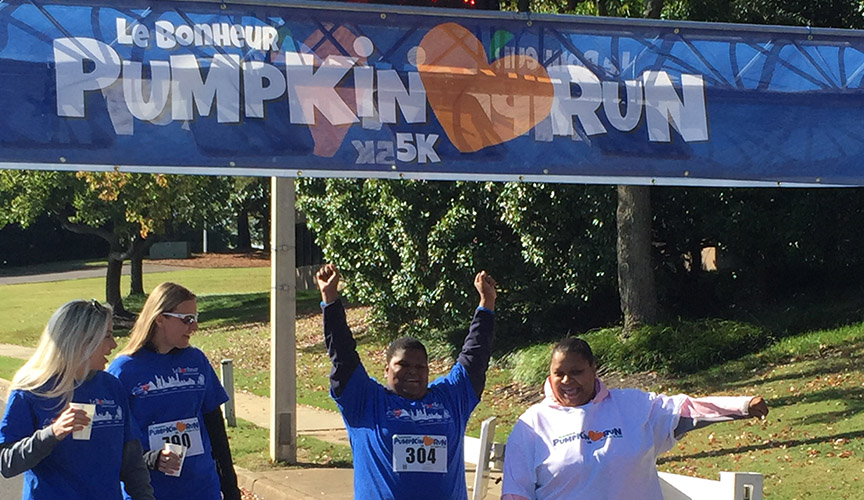A new start, a first finish
As Jamarius Richardson headed to the starting line of the Pumpkin Run 5K last October, he glanced at his mom, anxiety written across his face.
“He was nervous,” said his mother, Tammi Garlington. “Cause he’d never done anything like this before.”
Jamarius, 13, joined Le Bonheur’s signature race with others from the hospital’s Healthy Lifestyle Clinic. The clinic, launched in 2014 in partnership with the University of Tennessee Health Science
Center, is part of Le Bonheur’s comprehensive care for children battling pediatric obesity. The 5K run was a culmination of months of effort and training performed in Le Bonheur’s exercise lab. Last year’s team was the first of its class.
For most on the Healthy Lifestyles team, the 3.1-mile run was the first racing event they’d ever attempted.
“For many of the athletes on our team, when they first came to the clinic, they could not have completed a 5K,” said Le Bonheur Exercise Physiologist Webb Smith. “Our program included eight weeks of training, and we asked the whole family to participate.”
Every family had a coach from the clinic walk or run with them. Thus, the race kicked off, and Jamarius marched forward with his teammates, coaches and mom on hand to offer him support.
“He got tired along the way, and I told him that we were doing this for the kids, for everyone in the clinic, and that we’re doing it to help him stay healthy,” Tammi said. “Whatever time we finished, it didn’t matter. I told him we were going to finish.”

Pediatric obesity rates have tripled in the United States since the 1970s, according to the Centers forDisease Control and Prevention, and obesity now affects one in six children in the United States. Teens in Tennessee have the fourth highest rate of obesity in the country. The complications of pediatric obesity are many and varied: neurological, psychosocial, pulmonary, cardiovascular, renal, gastrointestinal, endocrine and musculoskeletal.
At Le Bonheur, a multidisciplinary team approach, including medicine, nutrition, exercise, behavioral health and in some cases surgery is available to provide innovative care for patients.
When children are referred to the Healthy Lifestyles Clinic, they are evaluated and then given a plan that includes, as Smith puts it, “prescribed exercise.” “The most intensive cases come here for exercise classes,” said Smith. “We have over 12 classes each week, which usually have small groups of three to four children to a class.”
Weight loss is not the only goal of the exercise program. With research suggesting that obese “fit” individuals have similar risk for developing many medical conditions to normal-weight “un-fit” individuals, much of the focus is on physical activity and fitness-based interventions rather than weight loss-centered intervention.
Patients who come to the clinic are given individualized exercise prescriptions that account for test results, medical conditions, motivation levels, goals, equipment and any other individual barriers. Since the clinic’s launch, about 42 percent of patients who stuck with the program have seen a 5 percent or greater decrease in body weight, and 26 percent have seen greater than 5 percent decrease in body mass index (BMI).
For the Healthy Lifestyle Pumpkin Run athletes, the hard work ended in a 100 percent race completion rate. Healthy Lifestyles Clinic mom Sandra Gilyard, who participated in the race with her son, said she’s seen increasingly positive results since coming to Le Bonheur. Her son, Tyler, finished the race after an hour and 20 minutes with his arms up in victory, a grin overtaking his face.
“I was proud, so proud he was able to finish it,” said Sandra. “And Tyler seemed to enjoy it so much … We’re going to have more adventures like this.”
Your Gift Matters
Obesity is a staggering problem, especially in the City of Memphis. Minorities are at greater risk of developing obesity at very early ages, but Le Bonheur Children’s Hospital is uniquely positioned to evaluate and help this at-risk group. Our work could in turn reveal new discoveries and treatment methods that could be replicated across the country. With your help, Le Bonheur plans to expand its pediatric obesity program to intervene in the lives of children and stem the rise of complications that can follow them throughout their lives.
Pediatric obesity is a serious problem that must be confronted in new and innovative ways in order to save children from a lifetime of complications. You can be part of that solution. Visit lebonheur.org/give to help today.
Help us provide the best care for kids.
Le Bonheur Children's Hospital depends on the generosity of friends like you to help us serve 250,000 children each year, regardless of their family’s ability to pay. Every gift helps us improve the lives of children.
Donate Now













